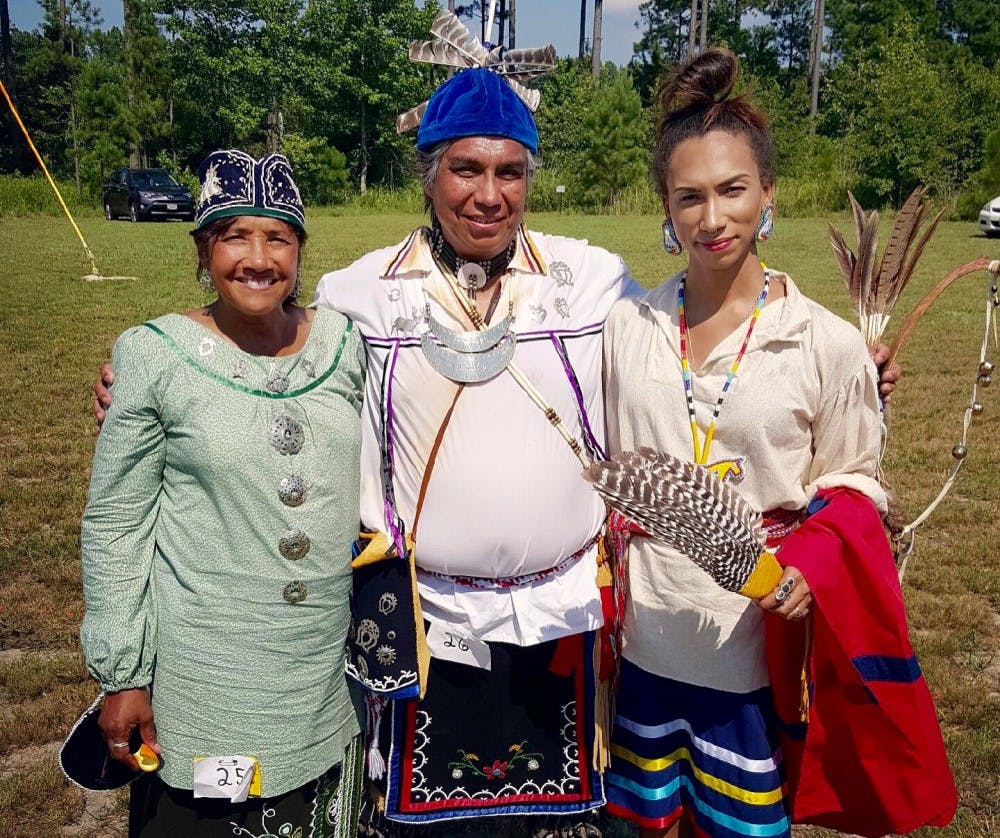A Richmond College Student Government Association (RCSGA) senator resigned last week after missing multiple government meetings and dressing up as a Native American for a social dance.
The Collegian obtained photos of the senator wearing feathers in his hair, a Washington Redskins shirt and red paint on his face and arms. RCSGA leadership was made aware of the costume and was “looking into it” the week before the senator handed in his resignation, Ken Anderson, RCSGA president, said.
The Collegian decided not to name the senator because we determined that the costume was likely a perpetuation of a larger cultural issue rather than a single, conscious decision to appropriate a culture.
The concepts of racism and cultural appropriation — the use of elements of a culture by members of another culture — are not new on college campuses.
“My culture’s not a costume. And it’s disrespectful on so many levels,” Young Brinson, who graduated from Richmond in 2015 and is a member of the Cheroenhaka Nottoway tribe of Virginia, said. “This is racism and cultural appropriation in the same instance. They happen at the same time.”
Monika Siebert, who teaches Native American literature at Richmond, shared Brinson's sentiment. “That I would simply just call racist behavior,” Siebert said.
For Robert Nelson, who taught Native American literature at Richmond for more than 30 years, some costumes aren’t necessarily offensive.
"For me it would depend on context," Nelson said. "I know some people who would find it offensive under any circumstances. Putting red paint on? Well that's not a very Indian thing to do. That's just foolish."
According to Richmond’s student consumer information on diversity, 0.3 percent of Richmond students identified as American Indian or Alaska Native in 2014.
Anderson said the senator didn’t specify why he resigned in his resignation letter. Anderson also said that the senator in question had an attendance issue.
“It’s common that people find that the attendance policy doesn’t work with their schedules, so that’s part of it,” Anderson said. Three other RCSGA members have stepped down from their positions because of time-commitment issues this semester, he said.
A senator is allowed three unexcused absences “and then you’re kicked out,” Anderson said. RCSGA will internally fill any empty seat on the body, he said.
The resigned senator did not respond to multiple requests for comment.
“I don’t think people in general should be punished for dressing up in inappropriate costumes," Mackenzie Neal, vice president of William and Mary's American Indian Student Association (AISA) and citizen of the Quapaw Tribe of Oklahoma, said. "They should be reminded that these are real people.
“It doesn’t mean that [the resigned senator] is racist, it’s that [the resigned senator] is part of a system that perpetuates this racist sentiment."
A well-known form of racist cultural appropriation is blackface, in which people who are not black or African American darken their skin. Blackface dates back to the 19th century.
There is a hashtag on social media that reads #CultureNotACostume that attempts to educate people about the impact of costumes on different communities.
“It is racist in the fact that our country has even made costumes out of other cultures,” Brinson said. “They’re not seeing their white privilege which is blocking them from seeing how racist this is.”
BuzzFeed released two videos to address the “culture not a costume” campaign, discussing offensive “Indian” Halloween costumes and Native American makeup tutorials on YouTube.
Neal said part of the frustration comes from the fact that the costumes are almost never realistic representations of Native Americans.
"You can't cherry-pick the parts of history and culture you like while disregarding reality," Neal said.
The resignation of the senator follows national discussions of insensitivity on college campuses and debates over the need for safe spaces and political correctness.
In December 2014, Bowdoin College students who dressed as Native Americans at a Thanksgiving party faced disciplinary action from the college.
The city of Richmond is home to the Redskins football team training camp, which has been criticized for appropriating Native American traditions and perpetuating stereotypes because of their team name and logos.
“But somehow with American Indians, because they have less political power, and less visibility, it’s still OK, and the Redskins are a perfect example here,” Siebert said.
Native American groups have challenged the use of the name “Redskins” and the NFL team’s logos for decades.
“Having a football team named Redskins is disrespectful on a historical level when they used to call us that on a derogatory level,” Brinson said. “You would never see a team with blackface as their mascot. So why are you doing this to us? It’s disrespectful.”
Neal referenced the oil pipeline protests in North Dakota, where American Indians, who see the pipeline as a cultural and environmental threat, have been gathering since April to protest the Dakota Access pipeline.
"You can't use our identity as a costume or prop one day and then pretend we don't exist the next," Neal said. "The crux of this cultural appropriation discussion is that non-Natives indulge in our symbols and traditions for themselves while conveniently avoiding uncomfortable social issues like the Dakota access pipeline that negatively impact our lives in critical ways."
Siebert, who has students in her class look for and report on stereotyping of Native Americans, sees a solution in education.
“[It's] the failure of our educational system because we still dress up as pilgrims and Indians for Thanksgiving in the first grade, and that just has to go,” Siebert said. “And it’s more of an indictment of a society, that [society] still makes this OK.”
For Brinson, racist appropriation of her culture exemplifies how the majority cultures in the U.S. don’t care about Native American historical context or present circumstance.
“It’s isolating… people don’t really care about Native issues or talk about native issues,” Brinson said. “Everyone likes to make us invisible.”
Contact news writer Claire Comey at claire.comey@richmond.edu

